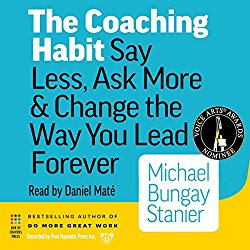The Coaching Habit
Principles
While this book is targeted at managers and leaders, it is equally applicable to anyone who has to coach, train, or communicate with others. It's main goal is to improve conversations and increase understanding between two parties.
- Ask before you answer
- Probe for what's really going on
- Lead others to the answer
- "Yes" is not the default answer
- Gain true commitment through asking a question
- Learning is more than doing or receiving an answer - it must be cemented by asking a question that solidifies its importance to the brain
Questions
- pg 143 - Whenever possible, ask "what" instead of "why" questions.
- pg 144 - Preface a question with the following options to soften its blow:
- Out of curiosity
- Just so I know
- To help me understand better
- To make sure that I'm clear
- pg 107 - To start and or set up for a conversation, ask, "what's on your mind?"
- pg 107 - As the conversation progresses ask, "and what else is on your mind?" to keep the information flow going. Don't be worried about a them running out of topics or a period of silence. Silence can be good, it allows the other person to think and really find out what is going on. It encourages introspection.
Answers
-
pg 144-145 - Many people are afraid of asking others what they can do to help since they might receive a request that is too much or it might create a habit. The good news is that you don't have to say yes. A few options are:
- No, I can't do that
- I can't do that... but I could do
- Let me think about that
- I'm not sure - I'll need to check a few things out
-
pg. 147 - If someone is asking you a question that you think that they could find the answer to or if you think that they are becomming dependent on your answers, the below sequence can be helpful. Ultimately, you do not want people to be dependent on you. As a coach, you want them to excel and increase their skills. That being said, this is not getting out of answering questions. You will and should answer questions but first, more often than not, you should help them try to find the answers before giving them one. That encourages true learning since if you just give an answer to them they won't retain it.
- *_That's a great question. I've got some ideas, which I'll share with you. But before I do, what are your first thoughts?
- After their response: That's terrific. What else could you do?
- After their response: This is all good. Is there anything else you could try here?
-
pg 183 - Replies to answers
Buy-in
- pg 164 - Many times when we ask someone to do something we only ever get tacit acknowledgement. We've all received the "ok's" or the general nodding or the "that sounds good" but we don't usually get actual commitment. When someone says, "that sounds good" what are they actually saying? They haven't committed. They just like your words.
- To overcome this hurdle and gain their commitment, ask: "Let's be clear, what exactly are you saying yes to?"
- "What could being fully committed to this idea look like?"
- "If you're saying yes to this, what are you saying no to?"
- Additional Q's centered around the 3 P's (Projects, People, Patterns).
Learning
- pg 188-191 - Most people don't learn if you just give them an answer. In addition, you may not have the best answer to their question. Further, they might know of a better answer but not be confident enough to move forward with it or just don't realize that they already have the answer.
- pg 197 - In order to cement a learning moment, use the following questions:
- "What was most useful for you?"
- "What have you learned since we last met"
